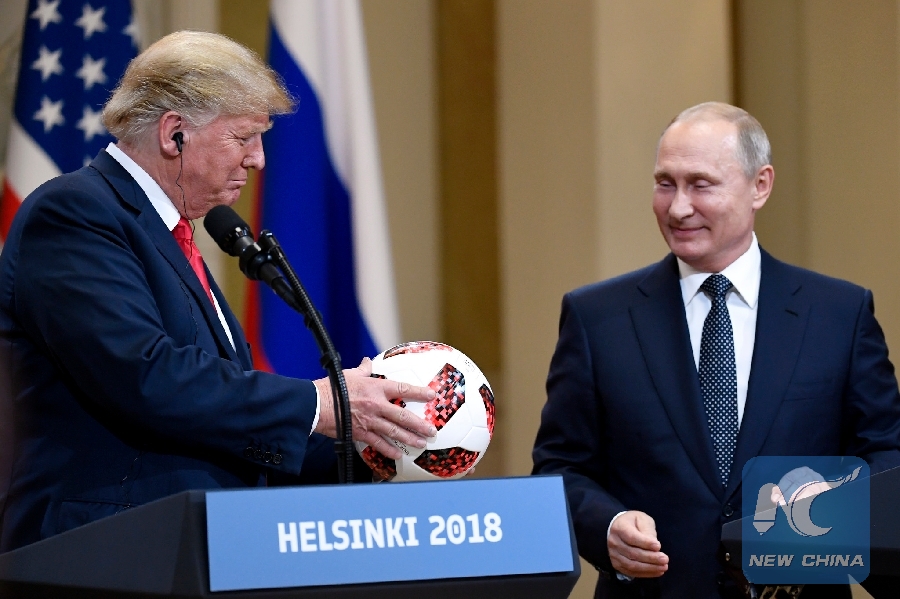
File Photo: U.S. President Donald Trump (L) holds a soccer ball during a joint press conference with Russian President Vladimir Putin in Helsinki, Finland, on July 16, 2018. (Xinhua/Lehtikuva/Antti Aimo-Koivisto)
WASHINGTON, Aug. 28 (Xinhua) -- The new U.S. sanctions on Russia over an alleged poison attack on a former Russian spy took effect on Monday. Some U.S. experts have said that the U.S. sanctions appeared to be milder than the U.S. State Department had previously threatened, perhaps as a precaution.
The U.S. Federal Register said in a notice on Monday that the new U.S. sanctions went into effect on that same day, as the State Department has determined that "the Government of the Russian Federation has used chemical weapons in violation of international law or lethal chemical weapons against its own nationals."
Under the new sanctions, U.S. foreign assistance, sales of defense articles and services, sensitive goods and technology concerning Russia, "any credit, credit guarantees, or other financial assistance" by U.S. government agencies, would be banned.
Meanwhile, the State Department stressed the necessity in the new move to partly waive sanctions in such areas as government space cooperation and commercial space launches, civil aviation and transactions with Russian nationals, wholly-owned U.S. subsidiaries in Russia, and Russian state-owned or state-funded enterprises.
"Right now, the U.S. is completely dependent on Russian space launches to send people to and from the International Space Station. It will be a year or so before America has a missile that can replace the Russian launch capability," Darrell West, a senior fellow at the Brookings Institution, told Xinhua.
It was also clear that, by including transactions with Russian nationals and state-owned or state-funded enterprises in its waiver list, the Trump administration was attempting to minimize the sanctions' effects and quiet Congress.
The latest U.S. actions were in sharp contrast with the State Department's Aug. 8 threats to punish Russian state-funded companies. Its earlier stated harsh demands on Russia, such as agreeing not to use biochemical weapons on its nationals, providing credible assurance of not engaging in such behavior in the future, and allowing third-party observers to verify Russia's actions on-site, were also left unmentioned this time.
Christopher Ford, assistant secretary of state, said in the notice that "these measures ... will remain in place for at least one year and until further notice," also marking a departure from the earlier U.S. threats that if Russia fails to fulfil the demands, Washington will impose stricter sanctions on Russia three months after the first batch of sanctions was implemented.
Analysts believed that the U.S. efforts to impose milder sanctions were due to the fact that harsher actions would undermine the United States' own interests, and deal a blow to the dialogue between the two nations that had been initiated only a short time ago.
Benjamin Friedman, a foreign policy and defense expert at Defense Priorities, a Washington-based think tank, told Xinhua that the bipartisan enthusiasm in the U.S. Congress tended to sanction Russia more harshly, so the administration may be trying to impose its own milder sanctions to "undercut the case for a new package of legally-mandated sanctions."
Former Russian double agent Sergei Skripal, aged 66, and his daughter Yulia were found unconscious on a bench outside a shopping center in Britain's southwestern city of Salisbury on March 4. Britain claimed the pair was exposed to a nerve agent and holds Russia responsible, while the Russian government has denied any involvement.
Russia responded to the new U.S. sanctions in a relatively restrained manner.
The Russian Embassy to the United States said that the sanctions "have no effect on our determination to follow our own course in international relations," when it blasted the U.S. sanctions and described them as "brute pressure,""hostile," "illegitimate" and "one-sided," among others.
It also expressed the desire for talks, without pointedly attacking the Trump administration.
Meanwhile, it stressed that U.S. "political elites seem to ignore the fact that every new 'seizure' of American sanctions 'fever' brings the U.S. close to the point of no return in resolving pressing international issues -- joint fight against terrorism and danger of WMD (weapons of mass destruction) falling into the hands of non-governmental entities."
Also on the same day, the Kremlin was quoted by media as saying that it needed time to assess the impact of U.S. sanctions before considering a retaliatory response, without elaborating any tit-for-tat threats as it usually did.
West said that the new sanctions will aggravate existing tensions in U.S.-Russian relations.
"Putin will take this as additional evidence America is anti-Russia and it may encourage future moves on his part that are anti-America and anti-Europe," he said, noting that Russia has been building alliances with Turkey and Iran, and "the U.S. sanctions will increase Russian friendships with those countries."
In spite of a mutual desire to improve dialogue, the deep-seated mistrust between the two sides remains hard to overcome, given the bilateral differences on Syria, Iran, Ukraine, Georgia and the North Atlantic Treaty Organization (NATO), among others.
(Matthew Rusling from Washington also contributed to the story.)

